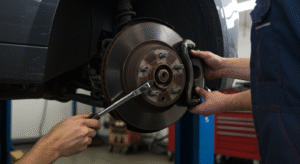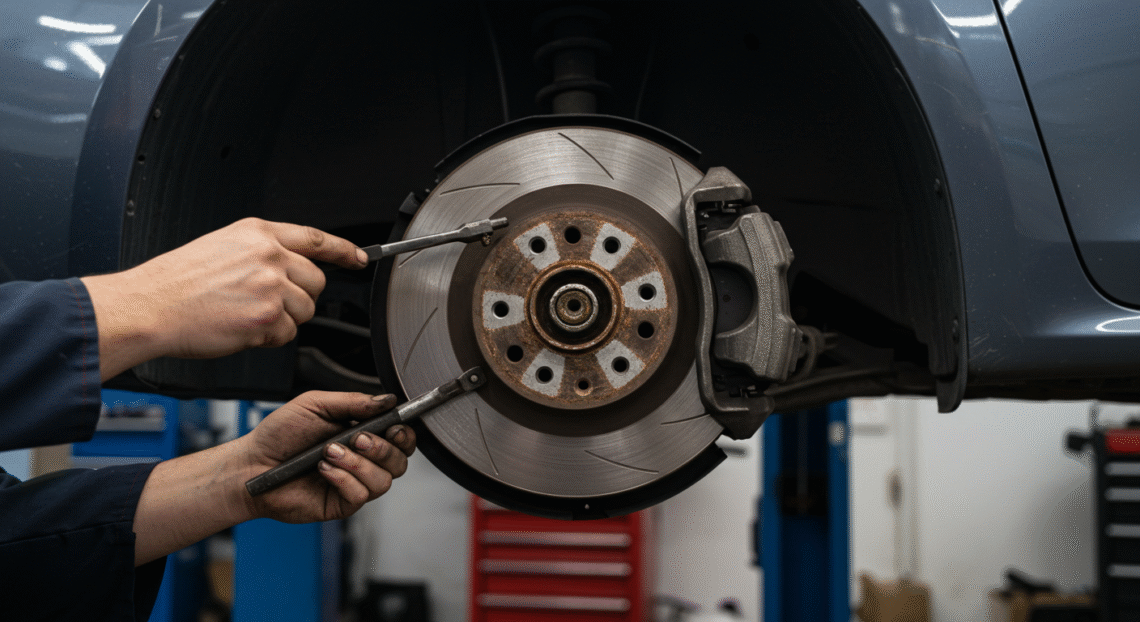How Long Should Brake Pads Last?
Brake pads are one of the most important parts of your car’s braking system. They press against the brake discs to slow and stop your vehicle safely. Because they face constant friction, brake pads wear out over time and must be replaced to maintain effective braking performance.
In the UK, many drivers want to know: how long should brake pads last? The answer depends on your driving style, type of vehicle, road conditions, and the quality of the pads themselves. Understanding these factors helps you plan timely replacements, reduce repair costs, and keep your car roadworthy.
Average Lifespan of Brake Pads
On average, brake pads last between 25,000 and 60,000 miles. However, this range varies depending on how and where you drive.
- City driving: Frequent braking in stop-start traffic wears pads faster, often around 25,000 to 35,000 miles.
- Motorway driving: Smoother journeys with fewer stops may allow pads to last 50,000 miles or more.
- High-performance or heavy vehicles: These may experience faster wear due to increased braking force.
In general, mechanics recommend checking your brake pads at every service or at least once a year. Regular inspections can prevent unexpected failures and protect the brake discs, which are more expensive to replace.

Factors That Affect Brake Pad Lifespan
Several key factors influence how long your brake pads last:
-
Driving Habits
If you brake late or apply heavy pressure frequently, your pads will wear out faster. Smooth, gradual braking reduces heat and friction, extending pad life.
-
Road Conditions
Hilly or rough roads require more braking, which increases wear. Flat, open roads are gentler on pads.
-
Brake Pad Material
- Organic pads: Quieter but wear quickly.
- Semi-metallic pads: Durable and common in modern cars.
- Ceramic pads: Long-lasting and produce less dust, but can be costly.
-
Vehicle Weight and Load
Larger vehicles or those carrying heavy loads place greater stress on the brakes, shortening pad lifespan.
-
Maintenance
Ignoring brake checks can lead to uneven wear. Cleaning brake components and replacing fluid on time ensures smoother braking performance.
Signs Your Brake Pads Need Replacing
You should never wait for complete failure before changing brake pads. Watch for these warning signs:
- Squeaking or grinding noises when braking.
- Reduced braking performance or longer stopping distance.
- Vibration through the brake pedal or steering wheel.
- Dashboard warning light for brake system issues.
- Visible thin pads (less than 3mm) when inspected through the wheel.
If any of these symptoms appear, book a brake inspection as soon as possible. Continuing to drive with worn pads can damage your brake discs and increase repair costs.
How to Check Brake Pad Condition
You can perform a simple visual and sound check at home:
- Look through the wheel spokes to see the pad thickness.
- If the pad looks thin or uneven, it may need replacing.
- Listen for high-pitched squealing or grinding noises.
- Test braking responsiveness; any change should be inspected by a mechanic.
For accurate assessment, have your brake system checked by a certified technician during servicing. Most garages in the UK will measure pad thickness and provide a wear report.
When to Replace Brake Pads
Most manufacturers recommend replacing brake pads when the material thickness reaches around 3mm. However, you should also consider replacement earlier if:
- The brake pedal feels spongy or unresponsive.
- You notice visible scoring on the brake discs.
- The vehicle pulls to one side when braking.
Timely replacement ensures consistent braking power and protects other parts of the system. For most drivers, this means a replacement every two to three years, depending on mileage.
Cost of Brake Pad Replacement in the UK
The cost of replacing brake pads in the UK varies depending on vehicle type and location.
- Front brake pads: £90–£160 on average.
- Rear brake pads: £80–£140 on average.
- Full brake pad and disc replacement: £250–£400 depending on make and model.
Premium vehicles and ceramic pads tend to be more expensive. Always request a full quote before agreeing to repairs, and ensure the garage uses manufacturer-approved parts.
Tips to Extend the Life of Your Brake Pads
You can make your brake pads last longer with a few simple habits:
- Brake smoothly: Avoid sudden, heavy braking.
- Reduce speed early: Anticipate traffic lights and slow down gradually.
- Limit unnecessary braking: Keep safe distances and allow natural deceleration.
- Maintain your vehicle: Schedule regular brake checks and fluid replacements.
- Avoid overloading: Keep vehicle weight within manufacturer limits.
These steps improve safety, extend component lifespan, and help you save on maintenance costs.
Choosing the Right Brake Pads
Selecting suitable brake pads is key to performance and safety. When buying replacements, consider:
- Manufacturer recommendations for your specific car model.
- Driving style and conditions: city vs motorway.
- Material type: Ceramic, semi-metallic, or organic.
- Warranty and quality certification.
Many UK garages offer advice based on your driving habits. Using quality parts from trusted brands ensures reliable braking and longer service intervals.
How to Maintain Brake Pad Performance
Proper brake maintenance keeps your pads effective for longer.
- Schedule inspections every 12 months or 10,000 miles.
- Keep brake fluid at the correct level and change it every two years.
- Clean brake dust build-up regularly.
- Replace pads in pairs to maintain balance.
Routine care not only prevents premature wear but also enhances road safety and reduces overall running costs.
Conclusion
Brake pads are a small component but play a major role in your car’s safety. Understanding how long brake pads last and recognising early signs of wear can prevent accidents and costly damage.
If you notice any unusual noises or reduced performance, don’t delay inspection. A quick check by a qualified mechanic ensures your brakes are performing as they should, keeping you and others safe on UK roads.



